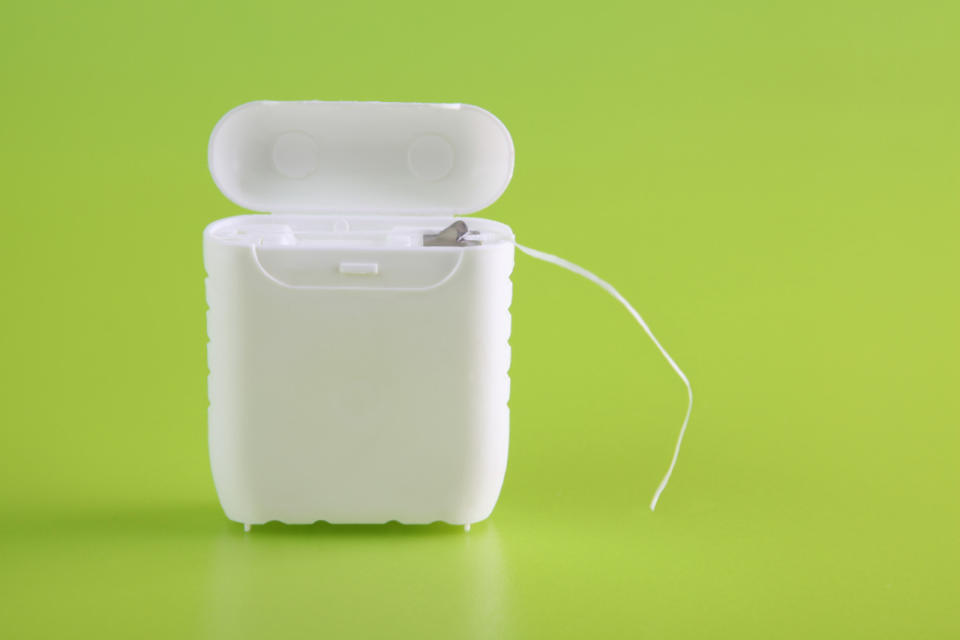Should you actually bother flossing your teeth?

Have we been wasting our time flossing our teeth? [Photo: Getty]
We all know that brushing our teeth is a twice daily, non-negotiable must-do. But how about flossing? Sure we might give our teeth the odd once over, when we remember, but on those stumble-home nights when it’s all we can do to run a brush over our pegs, it’s totally fine to skip it, right?
So when the latest Dietary Guidelines for Americans stopped recommending it and an investigation by Associated Press found “little proof that flossing works”, we couldn’t help but rejoice a bit. If a proper bonafide study says we don’t need to bother flossing our teeth, who are we to argue?
But then the old hygienist-guilt set in and we wondered how flossing can’t not be good for our pearly whites? Sure, our electric toothbrush can get rid of plaque and other nasties from the outside of our teeth, helping to prevent gum inflammation and tooth decay, but what about between them? Should we really be throwing away the dental floss quite so readily?
Despite various studies claiming flossing offers little or no benefit to overall oral health, the NHS still advises daily flossing. So what’s the deal?

Time to toss the floss? [Photo: Getty]
To floss or not to floss?
We consulted Dr Mervyn Druian, co-founder of the London Centre for Cosmetic Dentistry to get an expert view on the importance (or not) of flossing.
“Even though the recent report from Public Health England stated that there’s evidence that flossing makes no difference to oral hygiene, I disagree,” he explains. “Tooth brushing alone only cleans the front, back and top of the tooth, flossing cleans the sides and this is also the main area that harbours the harmful bacteria that causes tooth decay.”
Aside from cleaning the sides of the teeth which is one of the main areas bacteria can be harboured, Dr Druian also claims flossing can help rid your teeth of manky old food which can easily get stuck between them.
“Food can easily get stuck in your teeth, and that feeds the harmful bacteria,” he explains. “Plus food in your teeth is never a good look!”
According to Dr Druian there are in fact several dangers associated with not flossing your teeth including tooth loss, gum disease, gum recession, not to mention the dreaded halitosis. Grim! What’s more poor oral hygiene can have a serious knock-on effect to your overall health.
“There are a number of serious health issues related to poor oral hygiene, because the bacteria in your mouth breaks off and travels into your body. Studies have found direct links of poor oral hygiene with diabetes, pneumonia, strokes, heart disease and dementia,” he continues. Yikes!

Is flossing a waste of time? [Photo: Getty]
Now you’re regretting tossing that floss, right?
Dr Druian recommends flossing once a day, at night before you go to bed. “I floss after I’ve brushed my teeth, but you can do it before if you prefer. As long as you do a thorough job, it doesn’t matter when,” he says.
And what about the type of floss to use? “I personally don’t like thread floss, but prefer tape as its wider and fit easily between the teeth. Break off around 18 inches of floss and wind it around your middle fingers in your hands then hold the floss at a 45 degree angle and guide it between your teeth using a gentle rubbing motion. When the floss reaches the gum line curve it into a C shape against one tooth and then do the same to the other side. Don’t forget your back teeth! Some people prefer interdental brushes or water jet devices. Which are also both good.”
Do you floss your teeth? Let us know @YahooStyleUK
We’ve Been Brushing Our Teeth Wrong The Whole Time
Eat Your Way To A Brighter Smile: 10 Foods To Whiten Your Teeth


